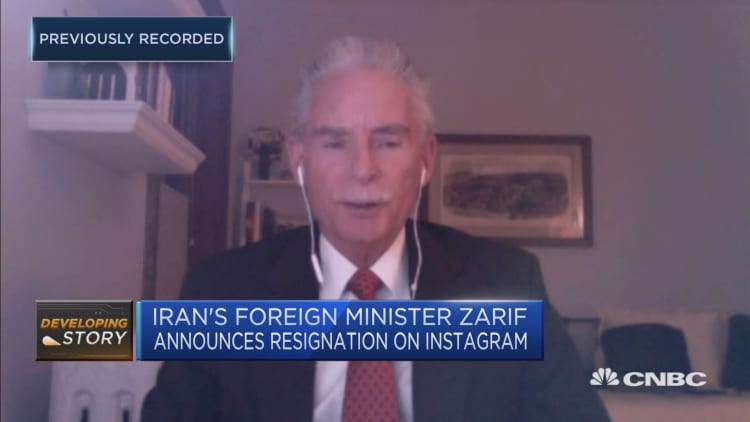Iranian President Hassan Rouhani has rejected the shock resignation of his vocal Foreign Minister Javad Zarif, who led negotiations for the 2015 Iranian nuclear deal.
Initially withholding reasons for the resignation in a cryptic Instagram post Monday night, Zarif later attributed his decision to political infighting and being sidelined in foreign policy decisions. On Wednesday morning, Rouhani officially rejected the resignation, writing in a letter: "I think your resignation is against the country's interests and I do not accept it."
If Zarif stays in his position, it will likely serve to bolster support for him and the Rouhani administration, some analysts say, blunting initial arguments that the resignation meant a win for Iran's hard-line factions.
The clamorous opposition to his resignation from various parties this week demonstrated the level of support that still remains for his policies, says Sanam Vakil, a senior fellow at think tank Chatham House and associate professor at Johns Hopkins School of Advanced International Studies.
"If indeed Zarif remains in the job, this resignation move definitely solidified both his public and political support, so he will be returning more empowered," she told CNBC on Wednesday.
While he was criticized by Iran's more conservative elements for his perceived outreach to the West and for what they say was a dismantling of the country's nuclear program, the U.S.-educated foreign minister has the backing of numerous lawmakers. Iranian media reported that a majority of parliament members penned a letter to Rouhani on Tuesday asking him to reject the resignation.
"The longer this drama plays out, the more likely Zarif is to be buoyed by an outpouring of foreign and domestic support, making his resignation read more like a gamble and an attempt to consolidate his leadership rather than to terminate his service with the Islamic Republic," said Behnam Ben Taleblu, a senior fellow at the Foundation for Defense of Democracies.
Often seen smiling in photos alongside EU leaders, many Western officials see Zarif as a moderately-inclined policymaker they can work with. But critics note that both Zarif and Rouhani defend policies that have made Tehran a pariah to much of the West, particularly its ballistic missile testing and support for Syrian President Bashar Assad.
And while still described by many as relative moderates, they are not the ones with the actual power, notes Ben Taleblu. Most foreign policy and security decision-making lies in the hands of the Supreme Leader, Ayatollah Khamenei, and Iran's Revolutionary Guard Corps, which are far more conservative.
"Zarif and Rouhani have always been window-dressing for the Islamic Republic," Ben Taleblu said. "But such figures have a limited degree of utility for the Islamic Republic, which has used their pretense of moderation to deflect foreign pressure."
'No credibility in the world'
Zarif's resignation followed a meeting between Iran's leadership and Assad, from which the foreign ministry was excluded. Zarif protested that exclusion, telling local media that it left him with "no credibility in the world as Iran's foreign minister." He also said that "The deadly poison for foreign policy is for foreign policy to become an issue of party and factional fighting," claiming that his aim was to see the role of the foreign ministry in national decision-making properly restored.
Rouhani on Wednesday wrote in his letter to Zarif, "It is the belief of myself and the Supreme Leader that you are a trusted, brave and devout individual standing on the frontline against America's multilateral pressures."
In an Instagram post shortly thereafter, Zarif wrote that he "had no other concern but the glory of foreign policy and the credibility of the foreign ministry."
Resignation demands for Rouhani and 'factional infighting'
Now celebrating its 40th anniversary since the Islamic Revolution, Iran is under crippling economic pressure. Demands for a presidential resignation and Zarif's attempted departure have brought fresh drama to Iran's leadership, already dealing with regional tensions and mounting discontent at home.
Iranians angry with skyrocketing inflation and a contracting economy beset by sanctions and corruption have called for Rouhani's resignation; in the last week, nine members of Iran's parliament presented a measure to disqualify him as president.

While Rouhani's removal would require support from two-thirds of parliament's 290 members, the calls reflect an increasingly frustrated population and ever-greater pressure on the president, whose support for the 2015 nuclear deal and attempts at improved relations with Western powers have not brought about the economic benefits initially promised.
Sanctions and a spiraling economy
The resignation demands represent growing discontent over what many Iranians now see as a failed attempt to engage with the West and the shortcomings of the 2015 nuclear deal, which was signed with a number of international powers and lifted economic sanctions on Iran in exchange for curbs on its nuclear program.
President Donald Trump withdrew the U.S. from the nuclear deal in May, imposing heavy sanctions on many of the country's sectors, most significantly oil. Iranian critics of the deal, like Khamenei, labeled Trump's move proof of his long-held claim that the West could not be trusted.
Sporadic protests triggered by economic frustrations have cropped up around the country since December 2017. The International Monetary Fund expects Iran's economy to contract by 3.6 percent in 2019 — compared to 3.8 percent growth in 2017 — due to the sanctions and subsequent reduced oil production.


